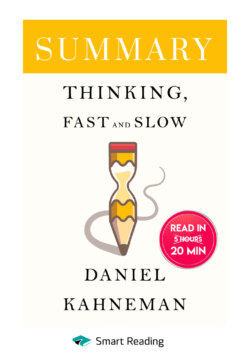Читать книгу Summary: Thinking, Fast and Slow. Daniel Kahneman - Smart Reading, Ольга Ганкова - Страница 3
Conflict of Two Systems of Thinking and Self-control
ОглавлениеIt often happens that you feel a conflict between the task you intended to perform and the automatic response that interfered with it. It's hard not to stare at an oddly dressed couple in a restaurant or focus on a boring book when suddenly we find ourselves constantly returning to a page where we failed to grasp what the author meant. Almost everyone has had to restrain himself so as not to send tell someone off, just like drivers who find themselves on an icy road and need to resist their natural reactions and instead follow the accepted instruction "steer into the direction of skid and do not slow down!". In other words, slow thinking is responsible for self-control.
The difference between impressions and beliefs can be huge. In the figure below you see the famous Müller-Lyer illusion. You have already measured the lines with a ruler and you know for sure that they are identical in length. But the lines are drawn in such a way that one of them seems to be longer than the other. And although slow thinking already knows that the lines are the same, fast thinking, which cannot be stopped and which perceives everything automatically, will still see lines of different lengths and assume that the lower one is longer. To counter the illusion, learn to mistrust your first impressions.
People are overconfident and tend to trust their own intuition too much. Many are repelled by mental effort, and they try to avoid it in every possible way. People often mistake the most plausible answer for the correct one. After all, it takes a much effort to toss it to the side: logic is not easy to test in the presence of persistent conviction. If people believe in the truth of any statement, they will willingly believe even untenable arguments in support of it. Fast thinking works automatically and cannot be turned off at will, making it difficult to prevent errors. Prejudices are not always avoidable, as the slow thinking may simply not be aware of the error. Mistakes can be avoided only if the slow thinking will specifically monitor this and make additional efforts. But to live your whole life on the alert is also not very good and impractical. Besides, slow thinking cannot replace fast thinking for making everyday decisions because it is so slow. The best thing to do is to compromise: learn to recognize situations where mistakes are possible, and try your best to avoid serious mistakes if the stakes are high.
